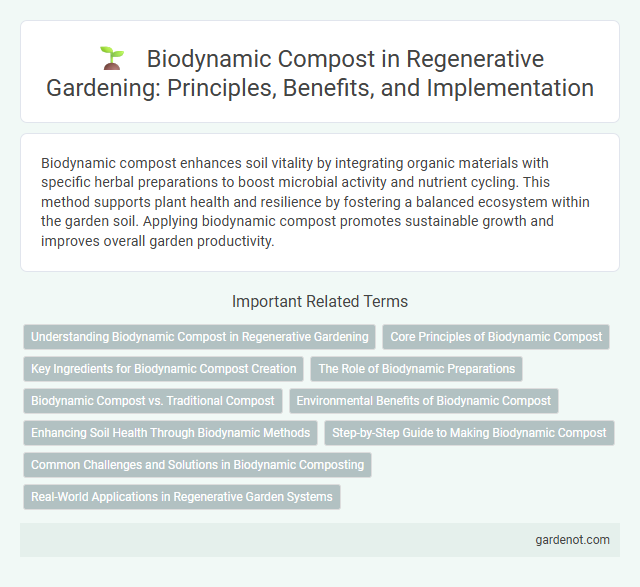Biodynamic compost enhances soil vitality by integrating organic materials with specific herbal preparations to boost microbial activity and nutrient cycling. This method supports plant health and resilience by fostering a balanced ecosystem within the garden soil. Applying biodynamic compost promotes sustainable growth and improves overall garden productivity.
Understanding Biodynamic Compost in Regenerative Gardening
Biodynamic compost in regenerative gardening enhances soil vitality by incorporating specific preparations and ingredients that stimulate microbial activity and nutrient cycling. This composting method follows biodynamic principles, integrating organic matter with herbal additives such as yarrow, chamomile, and nettle to improve soil structure and plant health. Understanding biodynamic compost techniques supports sustainable agriculture by fostering resilient ecosystems and increasing crop yields naturally.
Core Principles of Biodynamic Compost
Biodynamic compost emphasizes the integration of cosmic rhythms and natural forces to enhance soil vitality and plant health. Core principles include the use of specially prepared herbal and mineral additives, such as yarrow, chamomile, and silica, to stimulate microbial activity and nutrient cycling. This approach fosters a self-sustaining ecosystem by promoting balanced soil biology and improved fertility in regenerative gardens.
Key Ingredients for Biodynamic Compost Creation
Key ingredients for biodynamic compost creation include manure from healthy, pasture-fed animals, rich in beneficial microbes and nutrients essential for soil vitality. Plant materials such as legumes, nettles, and yarrow contribute crucial minerals and organic compounds that support microbial activity. The addition of specific herbal preparations like horn silica and valerian herbal extracts enhances decomposition and nutrient availability, promoting a balanced and regenerative garden ecosystem.
The Role of Biodynamic Preparations
Biodynamic compost incorporates specific preparations, such as horn manure (Preparation 500) and horn silica (Preparation 501), which enhance microbial activity and nutrient cycling in the soil. These preparations support soil vitality by stimulating beneficial fungi and bacteria, leading to improved plant health and resilience. Their role is central to regenerative gardening practices, ensuring a dynamic balance between soil, plants, and the surrounding ecosystem.
Biodynamic Compost vs. Traditional Compost
Biodynamic compost enriches soil fertility by incorporating specific herbal preparations and following lunar cycles, enhancing microbial activity and nutrient availability beyond traditional compost methods. Unlike traditional compost, which primarily decomposes organic matter through microbial action, biodynamic compost integrates holistic principles that support plant vitality and soil health holistically. Studies demonstrate biodynamic compost improves soil structure, increases earthworm populations, and boosts plant resilience more effectively than standard composting techniques.
Environmental Benefits of Biodynamic Compost
Biodynamic compost enhances soil fertility by increasing microbial diversity and nutrient availability, leading to healthier plant growth with reduced reliance on chemical fertilizers. It sequesters carbon effectively, mitigating greenhouse gas emissions and promoting long-term soil carbon storage. This method supports ecosystem balance by improving water retention and reducing soil erosion, contributing to sustainable and regenerative agricultural practices.
Enhancing Soil Health Through Biodynamic Methods
Biodynamic compost enriches soil health by integrating organic matter with specific herbal preparations that stimulate microbial activity and nutrient availability. These methods balance soil ecosystems, promoting resilience and fertility without chemical inputs. Enhanced soil structure and increased biodiversity result in improved plant growth and long-term sustainability in regenerative gardens.
Step-by-Step Guide to Making Biodynamic Compost
Biodynamic compost is created by combining organic materials such as manure, plant matter, and specific herbal preparations like yarrow, chamomile, and nettle, which stimulate microbial activity and soil vitality. The process begins with collecting and layering these components in a compost heap, ensuring proper aeration and moisture control to facilitate fermentation over several months. Regular turning and monitoring temperature help optimize decomposition, resulting in nutrient-rich humus that enhances soil structure and promotes regenerative garden health.
Common Challenges and Solutions in Biodynamic Composting
Biodynamic composting often faces challenges such as maintaining optimal microbial balance and ensuring proper aeration and moisture levels to enhance nutrient cycling. Solutions include regular turning to prevent anaerobic conditions and the use of biodynamic preparations like horn manure (Preparation 500) to stimulate microbial diversity and soil vitality. Monitoring compost temperature and moisture content closely helps achieve the active decomposition necessary for producing rich, regenerative humus.
Real-World Applications in Regenerative Garden Systems
Biodynamic compost enhances soil health by integrating microbial life and natural nutrients, promoting robust plant growth within regenerative garden systems. This composting technique supports nutrient cycling and increases soil organic matter, leading to improved water retention and resilience against pests. Farmers and gardeners apply biodynamic compost to create self-sustaining ecosystems that restore soil vitality and foster biodiversity.
Biodynamic compost Infographic

 gardenot.com
gardenot.com